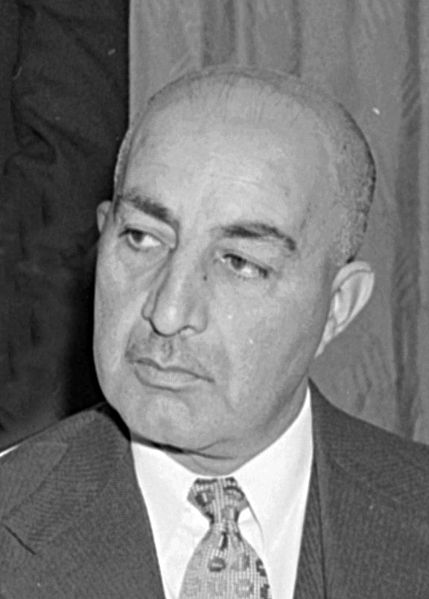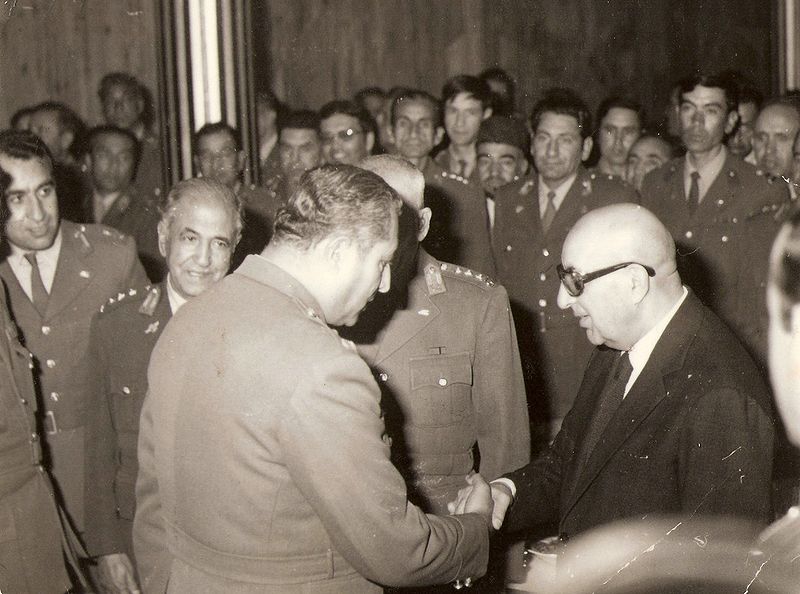<Back to Index>
- Philosopher Immanuel Hermann Fichte, 1796
- Mezzo Soprano Pauline Viardot García, 1821
- Dictator of Afghanistan Mohammed Daoud Khan, 1909
PAGE SPONSOR


Sardar Mohammed Daoud Khan or Daud Khan (July 18, 1909 – April 28, 1978) was Prime Minister of Afghanistan from 1953 to 1963 and later becoming the President of Afghanistan. He overthrew the monarchy of his first cousin Mohammed Zahir Shah and declared himself as the first President of Afghanistan from 1973 until his assassination in 1978 as a result of the Saur Revolution led by the Communist People's Democratic Party of Afghanistan (PDPA). Daoud Khan was known for his progressive policies, especially in relation to the rights of women, for initiating two five-year modernization plans.
HRH Prince Mohammed Daoud (also spelled Daud) was born at Kabul, the eldest son of the diplomat HRH Prince Mohammed Aziz Khan (1877 – 1933) (an older half-brother of King Mohammed Nadir Shah). He lost his father to assassination in Berlin in 1933, while his father was serving as the Afghan Ambassador to Germany. He and his brother Naim Khan (1911 – 78) then came under the tutelage of their uncle HRH Prince Hashim Khan (1884 – 1953). Daud proved to be an apt student of politics. Educated in France, he served as the Governor of the Eastern Province from 1934 – 35 and in 1938 – 39, and was Governor of Kandahar from 1935 – 38.
In
1939, Daud was promoted to Lieutenant General, and commander of the
important Kabul Army Corps until 1946. From 1946 – 48, he served as
Minister of Defence, then Minister of the Interior from 1949 - 1951. In
1948, he served as Ambassador to France. In 1951, he was promoted to
General and served in that capacity as Commander of the Central Forces
in Kabul from 1951 – 53. He was appointed Prime Minister in
September 1953 in an intra - family transfer of power that involved no
violence. His ten year tenure was noted for his foreign policy turn to
the Soviet Union, the completion of the Helmand Valley project, which radically improved living conditions in southwestern Afghanistan, and tentative steps towards the emancipation of women. By
1956, having been rebuffed by the US for both sales of arms and loans,
and in view of the independence of the former parts of the British Empire in South Asia, Daud supported a nationalistic and one sided reunification of the Pashtun people
with Afghanistan, but this would have involved taking a considerable
amount of territory from the new nation of Pakistan and was in direct
antagonism to an older plan of the 1950s whereby a confederation
between the two countries was proposed. The move further worried the
non-Pashtun populations of Afghanistan such as the minority Tajik and Uzbek who
suspected Daud Khan's intention was to increase the Pashtun's
disproportionate hold on political power. During that time, the
Pashtuns (or Afghans) consisted roughly 35 - 42 percent of
Afghanistan's ethnic demographics but they represented over 80 percent
of the government and held all important ministries, such as the
Ministries of the Interior, Foreign Affairs, Economic Affairs, Defense
and even most of the banks. With the creation of an independent Pakistan, the Durand line conflict with the British colonialists was inherited by the two countries. In
1961, as a result of Daoud's antagonistic policies and support to
militias in areas along the Durand Line, Pakistan closed its borders
with Afghanistan causing an economic crisis and greater dependence on
the USSR. The USSR became Afghanistan's principal trading partner. Within a few months, the USSR had sent jet airplanes, tanks, heavy and light artillery for a heavily discounted price tag of $25 million. In 1962, Daud sent troops across the international border into the Bajaur region of Pakistan in
an attempt to manipulate events in that area and to press the
Pashtunistan issue, but the Afghan military forces were routed by
Pakistani military. During this period the propaganda war from
Afghanistan, carried on by radio, was relentless. The
crisis was finally resolved with the forced resignation of Daud Khan in
March 1963 and the re-opening of the border in May. Pakistan has
continued to remain suspicious of Afghan intentions and Daud's policy
has left a negative impression in the eyes of many Tajik tribesmen who felt they were being disenfranchised for the sake of Pashtun Nationalism. In
1964, King Zahir introduced a new constitution, for the first time
excluding all members of the royal family from the council of
ministers. Daud had already stepped down. As well as having been prime
minister, Daoud had also held the portfolios of Minister of Defence and
Minister of Planning until 1963. On July 17, 1973, Daoud seized power from his cousin (and brother-in-law) King Zahir in a bloodless coup. Departing from tradition, and for the first time in Afghan history, Daoud did not proclaim himself Shah, establishing instead a republic with himself as President. In
1974, Daoud signed one of two economic packages that would enable
Afghanistan to have a far more capable military because of increasing
fears of lacking an up-to-date modern army when compared to the
militaries of Iran and Pakistan. Zahir Shah's democratic constitution with elected organs and the separation of powers was replaced by a now largely nominated Loya Jirga. A new constitution backed by a Loya Jirga was promulgated in February 1977, but failed to satisfy all political factions. In
1976, in a rift with the People's Democratic Party of Afghanistan, Daud
sought to increase relations and trade with other Muslim countries and
made a tentative agreement with Zulfikar Ali Bhutto on a solution to
the Pashtunistan problem. Internally, Daoud attempted to distance
himself from the communist elements within the coup. These moves were
highly criticized by Moscow, which feared that Afghanistan would soon become closer to the West, especially the United States; the Soviets had always feared that the United States could find a way to influence the government in Kabul. Daud's
army and police suppressed a growing Islamic fundamentalist movement,
whose leaders fled to Pakistan. There they were supported by Prime
Minister Zulfiqar Ali Bhutto and encouraged to continue the fight against Daud. A
coup against Daud, which may have been planned before he took power,
was repressed shortly after his seizure of power. In October 1973, Mohammad Hashim Maiwandwal,
a former prime minister and a highly respected former diplomat, died in
prison at a time when Parchamis controlled the Ministry of Interior
under circumstances corroborating the widespread belief that he had
been tortured to death. One of the Army generals arrested under
suspicion of this plot with Maiwandwal was Mohammed Asif Safi, who was later released and Daoud Khan personally apologized to him for the arrest. Daud lessened the country's dependence on the Soviet Union and went to Egypt, India, Saudi Arabia, and Iran for
aid. Surprisingly, he did not renew the Pashtunistan agitation;
relations with Pakistan improved thanks to interventions from the US
and Iran. The following year, he established his own political party, the National Revolutionary Party, which became the focus of all political activity. In January 1977, a loya jirga approved the constitution establishing a presidential, one-party system of government. President Daud met Leonid Brezhnev on
a state visit to Moscow from April 12 to 15, 1977. He had asked for a
private meeting with the Soviet Premier, to discuss with him the
increased pattern of Soviet actions in Afghanistan. In particular the
intensified Soviet attempt to unite the two factions of the Afghan
communist parties, Parcham and Khalq. Brezhnev
described Afghanistan's non-alignment as important to the USSR and
essential to the promotion of peace in Asia, but warned him about the
presence of experts from NATO countries stationed in the northern parts
of Afghanistan. In
1977 President Daoud made plans that the Government in Kabul would no
longer have any personal relationships with the Soviet Union and try to
make Afghanistan closer to the West, especially with other oil rich
Middle East nations. Afghanistan signed a co-operative military treaty
with Egypt and
by 1977 the Afghan military and police force were being trained by
Egyptian Armed forces. This angered the Soviet Union because Egypt took
the same route in 1974 and distanced itself from the Soviets. The April 19, 1978, funeral of Mir Akbar Khyber, the prominent Parchami ideologue who had been murdered, served as a rallying point for the Afghan communists. An estimated 1,000 to 3,000 persons gathered to hear the stirring speeches by PDPA leaders such as Nur Muhammad Taraki, Hafizullah Amin and Babrak Karmal. Shocked
by this demonstration of communist unity, Daoud ordered the arrest of
the PDPA leaders, but he reacted too slowly. It took him a week to
arrest Taraki, Karmal managed to escape to the USSR, and Amin was
merely placed under house arrest. According to PDPA documents, Amin
sent complete orders for the coup from his home while it was under
armed guard using his family as messengers. The
army had been put on alert on April 26 because of a presumed
"anti-Islamic" coup. On April 27, 1978, a coup d'état beginning
with troop movements at the military base at Kabul International Airport, gained ground slowly over the next twenty-four hours as rebels battled units loyal to Daud Khan in and around the capital. Daoud and most of his family were shot in the presidential palace the following day. His
death was not publicly announced after the coup. Instead, the new
government declared that President Daoud had "resigned for health
reasons." In 1979 Taraki was killed by Amin, who, in turn, was killed
by the KGB; Karmal died in 1996 of cancer in Moscow. On
June 28, 2008, the body of President Daoud and those of his family were
found in two separate mass graves in the Pul-e-Charkhi area, District
12 of Kabul city. Initial reports indicate that sixteen corpses were in
one grave and twelve others were in the second. On December 4, 2008,
the Afghan Health Ministry
announced that the body of Daoud had been identified on the basis of
teeth moulds and a small golden Quran found near the body. The Quran
was a present he had received from the king of Saudi Arabia. On March 17, 2009 Daoud was given a state funeral.
In
1934, Daoud married HRH Princess Zamina Begum (1917 - 28 April 1978),
sister of King Zaher Shah. The couple had four sons and four daughters.